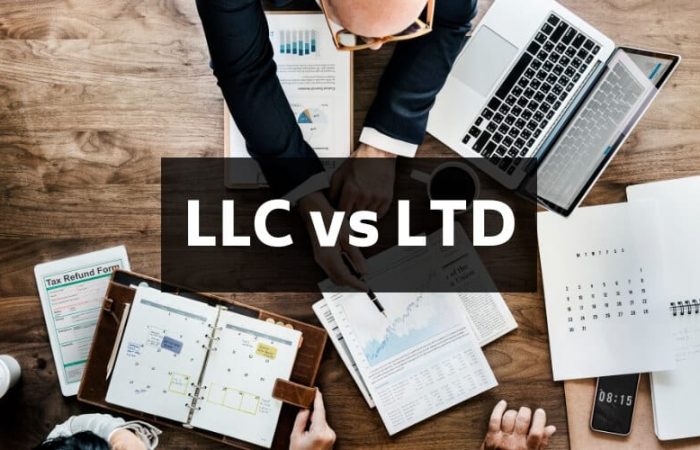To start a new business, you must understand the differences between LLCs (Limited Liability Companies) and LTDs (Limited Companies).
Protecting your business is always your priority and understanding how these two entities work will help you know how you can keep your business safe.
In this article, we will be sharing everything you need to know about LLCs and LTDs including how they work, how to start one, and the key differences between them. So if you are planning to start a new business – this article is for you!
Table Of Content
What are LLCs?
What are LTDs?
Differences Between LLCs and LTDs
Legal Requirements and Formation Process
Management and Ownership Structure
Advantages and Disadvantages of LLCs
Advantages and Disadvantages of LTDs
LLC or LTD: Which One Should You Pick?
What are LLCs?
LLCs or Limited Liability Companies are a type of business entity that protects owners from any personal debts or liabilities. This means if the business faces any financial trouble, owners won’t hold any responsibility.
Every business has to pay taxes and so do LLCs. The taxes are often referred to as “Pass Through” – this means LLCs don’t pay taxes directly on their profits. The profits and losses are passed through each member – meaning they have to pay taxes on their returns.
In simple words, members must report their share of profits and losses on their income tax rather than paying a separate corporate tax.
What are LTDs?
LTDs are mostly run by shareholders and board members. This business model also helps to limit the liabilities of its owners (shareholders and board members).
During any loss, owners and investors will not get affected since LTDs limit corporate liabilities. LTDs are mostly corporate business models meaning their ownership is divided into shared – which is owned by shareholders.
When it comes to taxes, LTDs are entitled for paying both corporate income tax as well as dividend tax whereas LLC owners are not entitled to pay any personal tax.
Differences Between LLCs and LTDs
Understanding the differences between LLCs and LTDs is very important if you want to start a new business. Here are the key differences that you should be aware of:
1. Legal Structure
LLCs tend to protect their owners from any debt or other financial issues. In simple words, LLCs are a combination of corporation and partnership – which helps owners stay protected from any personal losses.
Similar to LLCs, LTDs also help their owners to stay protected from any personal losses during any financial crisis. LTDs must be registered with the local government and follow the rules and regulations to operate.
2. Ownership
LLCs are owned by their members. Members are the founders of the company. Now when it comes to managing the business, it’s mainly managed by one or more managers appointed by the member. These managers operate all the day-to-day tasks.
LTDs are owned by their shareholders. Shareholders have special rights to participate in decision-making and voting. So if there is something new to launch or something needs to change, directors might need shareholders’ opinions to do so.
3. Management
LLCs are managed by managers who are appointed by the members. The managers can be members or non-members who will be responsible for running any day-to-day tasks.
When it comes to LTDs, they are run by board members or directors. These directors are chosen by the shareholders and they are responsible for making decisions and running operations.
4. Liability
LLCs tend to protect their owners from any financial disputes and debts. This means owners are not accountable for any losses – which means their assets won’t be affected by any financial dispute.
Similarly, LTDs also limit the liability of their owners from any corporate loss. This means if the company gets into debt or incurs any loss, owners’ financial assets won’t get affected.
5. Taxes
Taxes can be a major difference between LLCs and LTDs. LLCs aren’t required to pay any corporate tax meaning there are no taxes on business profits. Instead, owners pay income taxes on their profits and losses.
When it comes to LTDs, they have to pay both corporate and dividend taxes. The shareholders of LTDs also have to pay capital gain taxes if they decide to sell their shares.
LLCs and LTDs: Legal Requirements and Formation Process
As you can tell by now LLCs and LTDs are different from each other – so it only makes sense their legal requirements and formation process will be different as well.

LLCs
Here are the legal requirements and formation process of LLCs:
1. Registration
To register an LLC, first, you have to register with the state’s secretary of state office and get a business license. Depending on the type of business you are planning to run, you must also obtain other required permits and licenses.
2. Find a Suitable Name
Choosing a business name has always been an important part of forming a business. Your chosen business name must not be similar to other business names and should also include words like “LLC” or “Limited Liability Company”.
3. Filling the Articles of Organization
Once you are done with the basics, you have to file Articles of Organization with the secretary of state office to officially form your LLC. The documents should include all the information about the members, managers, and the purpose of your business.
4. Required Documents
Here is the list of documents that you need to register your LLC:
- The names of the LLC members and their addresses
- The name of the LLC registered agent
- The statement of the purpose of the business
*Note: The document might vary depending on the state you are currently operating.

LTDs
So now that we know how we can form an LLC, let’s find out how you can set up an LTD. To give you a head start, it’s important to share that forming an LTD is more complex than forming an LLC.
This is because forming an LTD requires more paperwork and registration steps.
The first step is to file a memorandum and articles of association with the state’s secretary of state – the process might vary depending on the state you are in.
Here is the list of documents required for forming an LTD:
- The name of your business and address
- The name of the directors and the shareholders (minimum one)
- A memorandum and articles of association
- Details of the people who have 25% of the company shares and voting rights
Here are the necessary steps to form an LTD:
1. Find a suitable name for your business
2. Select at least one director or a company secretary
3. Select the shareholders and guarantors
4. Gather all the documents mentioned above
5. Register the company with the Companies House
6. Get your UTR (Unique Taxpayer Reference) number
7. Register your LLC for taxes
LLCs and LTDs: Management and Ownership Structure
Let’s take a look at the management and ownership structure of LLCs and LTDs:
LLCs
As we mentioned earlier – LLCs are operated by members/owners of the company. All the major decisions are taken by these members. Members can elect a manager among them or hire an individual to operate day-to-day tasks.
When it comes to the flexibility of the structure of the LLC – it is more flexible than LTDs. Since the members take the majority of the decisions, there is no need for a lot of paperwork or meetings.
LTDs
The business structure of an LTD can be a bit more complex than an LLC. This is because two parties run the company – shareholders and directors. Directors are chosen by the shareholders who later run the majority of the business.
But when it comes to major decision-making – shareholders can take a part in it. For example, if there is a new product that will be launched, shareholders can give their opinions on the product.
Similarly, if there is a change in the policies of the business, shareholders can vote for the decision-making.
LLCs and LTDs: Liability Protection
Both LLCs and LTDs are entitled to limit the liability of their owners. Here is how the process works for LLCs and LTDs:
LLCs
The LLC business structure separates the business from its owners. This separation is meant to help the owners if there is any financial dispute such as debt.
This simply means, if the LLC can’t repay its debt, creditors will go for the assets and bank accounts of the LLC. This means the owners are safe in this situation.
Even if the company goes bankrupt, the owners will still be protected thanks to the policies of the LLC. But in case of any fraud or negligence, the owners have to take full responsibility.
LTDs
Similar to LLCs, LTDs also protect their owners from any financial dispute. So owners will stay safe if the company goes bankrupt. Creditors will only take over the assets of the company so the owners will be safe.
But in case of tax fraud or illegal trading, both directors and shareholders can get into trouble. All the details should be included in the business policies.
LLCs and LTDs: Taxation
Taxes are another major differentiator between LLCs and LTDs – let’s take a look at how taxation works with LLCs and LTDs:
LLCs
When it comes to LLCs, they don’t pay taxes directly as corporate businesses do. People who own the LLCs usually pay taxes on their share of profits. LLCs are also known as “Pass
Through” entities – which means the losses and profits are passed through the owners.
There are different types of taxes that LLCs have to pay:
- The State Government Taxes
- The Federal Government Taxes
- And The Local Government Taxes
Every member also known as the owner has to pay taxes on the money they make from the LLC. If they are self-employed, they also have to pay self-employment taxes. In addition, if you have people working for you and you pay them, you have to pay payroll taxes too.
LTDs
Unlike LLCs, Limited Companies have to pay corporation tax on their profits – which is 21%. Depending on the income of your business, you can take advantage of the small profit rate or the dividend allowance – which is around 19%.
There are also dividend taxes if the LLC receives dividends from the business itself. Shareholders have to pay taxes again when they are paid the dividends after-tax profits.

Advantages and Disadvantages of LLCs
Here are the pros and cons of LLCs:
Advantages
Here are the advantages of LLCs
1. Tax Benefits
Since LLCs are pass-through entities – the taxes are paid by the owners depending on the profits and losses of their shares. This means owners don’t have to pay double taxes on their income – meaning they can avoid double taxation.
2. Liability Protection
LLC owners will not be affected if the company falls into debt or any other obligations. This means if the company goes bankrupt or anything happens to it, the owners will be safe. This means if the company fails to repay its debts, the creditors will only go for the company’s assets.
3. Fewer Corporate Formalities and Paperwork
LLCs are easy to set up since they don’t have too many criteria or paperwork compared to other business models like LTDs. This leads to less paperwork and fewer corporate meetings – which makes LLCs extremely easy to manage.
4. Flexibility
When it comes to flexibility LTDs can’t beat LLCs. The owners also known as the members are the ones who decide how to structure the company. Unlike LTDs, there is no need for the involvement of shareholders – so it’s only the members who run the company.
5. Easy to Allocate Profits and Losses
Since there are only members who are running the company – it will be very easy to distribute the profits. This means if any member wants to take more risks to make more money, they can. Of course, they have to consult with other members to do so.
Disadvantages
Here are some of the disadvantages of LLCs:
1. High Costs
Just like any business, forming an LLC can be costly. There are tons of fees plus other operating costs as well. This can soon become a nightmare if you are planning to start a business with a limited budget.
2. Hard to Transfer the Ownership
When it comes to transferring the ownership of an LLC, all the owners must agree to the decision. This can make things complicated if there is a situation that requires a change of ownership.

Advantages and Disadvantages of LTDs
So now that we know the pros and cons of LLCs, let’s take a look at the pros and cons of LTDs:
Advantages
Here are the pros of LTDs:
1. Liability Protection
Just like the LLC business model, LTDs also help their owners to protect from liabilities. This means the shareholders are not liable for any kind of debt or other financial obligations taken by the business. This makes things easier for shareholders so they can invest more.
2. Good for Brand Value
LTDs are well known for their brand value. Since there are investors involved – it makes people see your business as a genuine one. This also increases your chances of attracting new customers. This will help you grow your business faster in no time.
3. Flexible Capital Structure
LTDs offer a flexible capital structure that makes things easier for the shareholders. This means shareholders can decide how much equity they want in exchange for their investment.
This makes it simple for investors to manage their finances and decide how much they want to invest.
4. Your Business Name will be Protected
LTDs make it easier to protect your brand. This means no one can use your name for their business. Unlike other business models, LTDs own the right to protect their business name. And if someone tries to copy their brand, they can sue them.
5. Tax benefits
Depending on what jurisdiction you are currently in, you might be able to get some tax deductions for running an LTD. There are many tax deductions available for running an LTD. Make sure to consult an account to get the most out of it.
Disadvantages
Here are the cons of running an LTD:
1. Can be Costly to Form
LTDs are full of expensive fees and legal costs. Depending on the size of the business, you have to pay certain fees to run your business legally. In addition to that you will have other costs such as operational costs.
2. Lots of Paperwork and Administrative Work
You have to keep records of all the shareholders, meetings, business accounts, legal papers, and whatnot. This can be a big issue for many people since not everyone is experienced in handling all these tasks. You may have to hire someone to do the job.
3. Rigid Business Structure
Since there is an involvement of shareholders, it can be difficult to manage the company’s operations.
Even if you are the head of the company, you still have to wait for the shareholder votes to make any decision. Sometimes this can take time and even business disputes.
Read Also: Retailer vs Reseller: What’s the Difference?

LLC or LTD: Which One Should You Pick?
Choosing between LLCs and LTDs can be a tough choice as many factors come into play. Here are some of the main ones:
1. Protection
When it comes to protection, both LLCs and LTDs are almost the same. Both members and shareholders will be safe from any business debt or obligations. But with LTDs, your business name will be protected as well – so you are getting an extra layer of protection.
2. Taxes
Taxes can be a big differentiator when choosing between LLCs and LTDs. Both other certain tax deductions, depending on the jurisdiction you are in. However, with LLCs, you are only bound to pay individual income tax and not corporate taxes.
3. Formation Costs
Forming both LLCs and LTDs can be a costly venture. However, setting up an LTD might cost you more. As we mentioned earlier, there are many fees and legal costs that need to be paid. So depending on your budget, you have to decide which one to pick.
4. Business Structure
LLCs have a more simple business structure than LTDs. LLCs are mostly run by their members but LTDs on the other hand are run by directors and shareholders.
This means if you are running an LTD, you have to wait for shareholders’ and other directors’ approval to make any business decisions.
5. Future Growth
If you are planning to run a business in the long run, LTD is your best choice. With an LTD, you can attract more investors to invest in your company. This can lead to more capital and business growth.
On the other hand, with an LLC, you are kind of limited when it comes to business growth.
Conclusion
So there you have it! Now you know the key differences between LLCs and LTDs. As you can see, there are significant differences between both entities. So make sure to take your time to find which business model suits your needs. You can also talk to a business expert to discuss the differences. Good luck!

